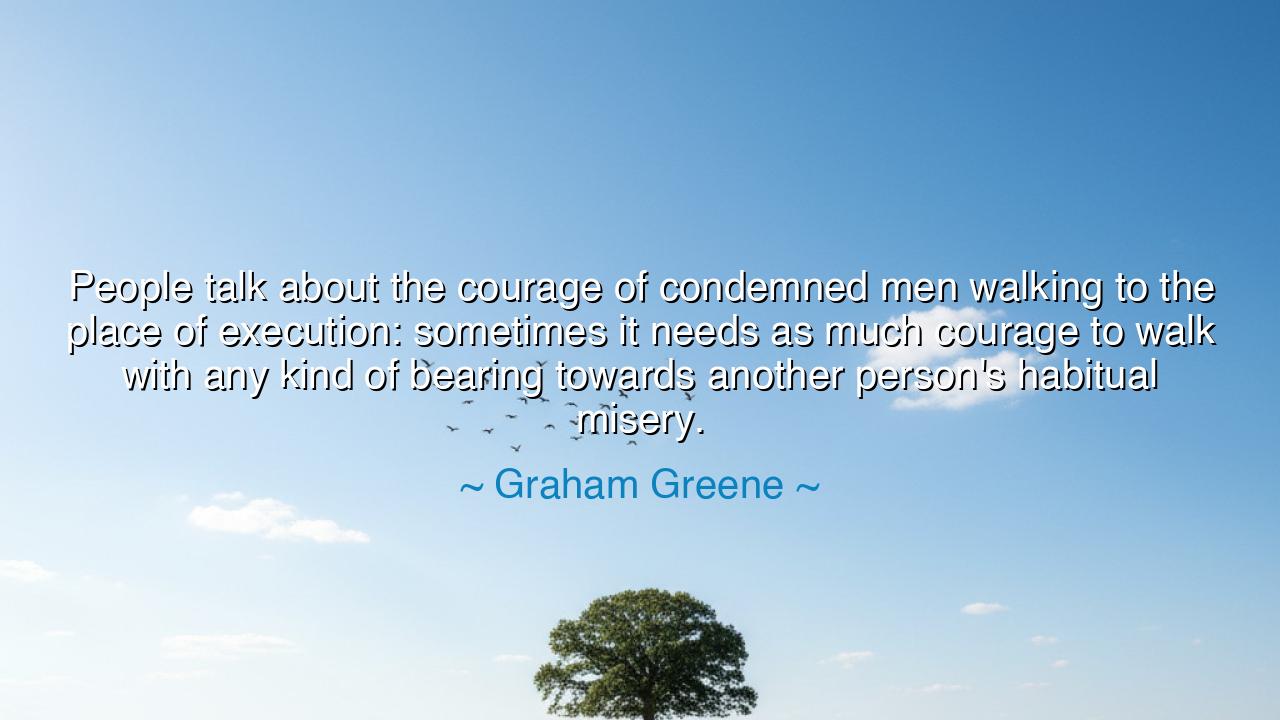
People talk about the courage of condemned men walking to the
People talk about the courage of condemned men walking to the place of execution: sometimes it needs as much courage to walk with any kind of bearing towards another person's habitual misery.






The novelist and moral philosopher Graham Greene, whose pen carved the depths of the human soul, once wrote: “People talk about the courage of condemned men walking to the place of execution: sometimes it needs as much courage to walk with any kind of bearing towards another person's habitual misery.” In this single sentence, he reveals a truth far more profound than the world often dares to face — that courage is not only found in the shadow of death, but also in the quiet act of confronting suffering that is not our own. The condemned man’s courage is dramatic and visible, but the courage to walk beside the suffering — to look into the eyes of another’s pain without turning away — is subtler, rarer, and perhaps holier.
To understand this saying, we must enter the mind of Greene, a writer who wandered through the moral labyrinths of humanity. He had seen the world’s dark corners — war, poverty, and despair — and he knew that the greatest test of character is not how one faces one’s own suffering, but how one faces the suffering of others. Many people can endure their own pain with pride; few can bear to witness another’s misery without retreating. For there is a sacred discomfort in empathy, a weight that presses upon the heart when we choose to step into another’s sorrow. It takes courage not to look away, not to harden one’s heart, but to remain open — vulnerable before the tears and wounds of another soul.
“Habitual misery” — the phrase itself is heavy with meaning. Greene does not speak of sudden tragedy or noble suffering, but of the weary, endless kind — the pain that has no climax, no audience, no relief. To walk toward such misery, to face it without despair or condescension, demands a different kind of bravery. It is easy to show compassion once, to lend comfort in a moment of drama. But to return day after day, to meet another’s sorrow that never lifts — this is endurance of the spirit. It is the courage of nurses who tend to the dying, of teachers who guide broken children, of those who stay beside the lonely and the lost. Their strength is quiet, almost invisible, yet it holds the world together.
Consider the story of Mother Teresa, who walked daily into the streets of Calcutta to touch those whom the world had abandoned — the sick, the dying, the lepers. Hers was not the courage of defiance before an executioner, but the courage of compassion, renewed each dawn. She faced habitual misery not once, but for decades, and never allowed her soul to harden. Each time she lifted a dying man from the gutter, she was walking, as Greene wrote, “towards another person’s habitual misery.” And yet she did so with bearing — with the calm dignity of one who refuses to let the darkness consume her light. Such courage is the rarest form, for it asks not for glory, but for love.
In truth, most people fear the pain of others more than their own. It reminds them of their helplessness, their fragility, their smallness before life’s sorrow. To look upon another’s grief is to see a reflection of our own vulnerability. That is why so many turn away — they hide behind indifference or words of comfort that cost them nothing. But the wise and the compassionate do not flee. They stand firm, not because they are unafraid, but because they know that courage is not the absence of fear, but the triumph over it. It is the act of holding another’s suffering in one’s heart without being broken by it.
And so, Greene’s words are not merely a meditation on pity, but a call to moral bravery — the bravery to stay human in the presence of pain. To comfort a friend in despair, to visit the sick, to listen without judgment, to extend kindness where it is met with bitterness — these are acts of everyday heroism. For in each of these moments, we walk toward another’s misery instead of away from it. We become the bearers of compassion, the quiet warriors of mercy, whose courage gives strength to those who can no longer stand on their own.
So, my child, remember this ancient lesson wrapped in Greene’s modern words: do not reserve your courage for grand gestures or dramatic ends. The world has enough heroes who face death; what it needs are those who can face life — its tears, its loneliness, its endless ache — with grace and compassion. When you encounter suffering, do not look away. Step closer. Offer your presence, your listening, your hand. For in doing so, you will discover the noblest form of courage — the courage of the heart, which transforms misery into meaning, and humanity into something divine.






AAdministratorAdministrator
Welcome, honored guests. Please leave a comment, we will respond soon